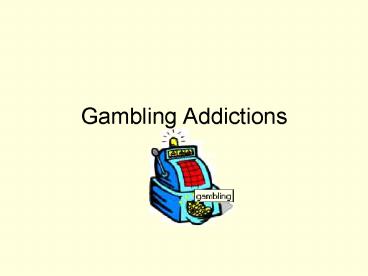Gambling Addictions - PowerPoint PPT Presentation
1 / 12
Title:
Gambling Addictions
Description:
Prefer 'skill' games. Gamble to beat others/system. 2)Escape Gamblers ... psychodynamic = temporary escape from self (unconscious desire to punish self or ... – PowerPoint PPT presentation
Number of Views:77
Avg rating:3.0/5.0
Title: Gambling Addictions
1
Gambling Addictions
2
History
- Forms of lotteries date back to biblical times
- 1892 ? CCC ? complete ban on all forms of
gambling - 1969 ? CCC amended ? First Nations, charitable
groups, provincial and federal govts permitted
to use lotteries - By 1980 Pathological Gambling included in DSM-III
as a disorder of impulse control - 1985 ? CCC ? Private operators permitted under
provincial licensing authority
3
Gambling
- For 4-6, gambling becomes pathological
- Average age 25-34yrs.
- Teens are 3xs more likely than adults to become
problem gamblers - settings produce state of excitement
dissociation - After several minutes ? increased dopamine and
decreased serotonin - Repeated pairings ? arousal begins immediately
upon entering casino (classical conditioning)
4
Characteristics of those withlow risk of
compulsive gambling
- Gambling is enjoyable complement to other
activities - Gambling with family and friends (rather than
alone) - Gambling confined to limited times
- Gambling has predetermined limits for losses
5
Characteristics of those withhigh risk of
compulsive gambling
- Opposite to above but often have coexisting
problems - 52 have other substance abuse problems
- 76 indicate major depressive disorder
- 28 have recurrent panic attacks
- 50 contemplate suicide
6
Types of Problem Gamblers(by etiology)
- Normal problem gamblers
- ? problems seen as consequences (not causes) of
gambling - ? no previous emotional/psychological problems
- ? significant event leads to preoccupation (i.e.
a big win) - ? depression, anxiety, etc. are consequences
7
B) Emotionally disturbed gamblers
- ? pre-existing mood disturbances
- ? gambling used to modify emotions
- ? seek escape
- ? gambling euphoric and analgesic experience
- ? pre-existing issues (i.e. anxiety, depression,
problems concentrating) alleviated by gambling
environment - ? common negative childhood experiences,
neurotic personality traits, some form of
negative life event
8
C) Biologically-based gamblers
- ? dysfunction in neurotransmitters ? low levels
of serotonin - ? often labeled ADD as children
- ? inability to delay gratification, diminished
responses to punishment, sensation seeking - ? gambling usually starts at early age
9
Types of Gamblers(by personality traits)
- Action Gambler
- Usually domineering, controlling, manipulative
men - players
- Intelligent group others see them as energetic,
persuasive, confident - Usually started gambling at an early age
- Prefer skill games
- Gamble to beat others/system
10
2)Escape Gamblers
- Gambling becomes a problem later in life
- Others see them as nurturing, responsible
- Become compulsive almost immediately
- Leads to deep sense of guilt and shame
- Hypnotic-like state while gambling
- Prefer luck games
- History of abuse
- Codependent
11
Three Phases of Problem Gambling
- Phase I ? winning ? begins as a social
activity, but gambling more frequently and
beginning to accumulate debt ? dvlpd tolerance - Phase II ? losing ? chasing your losses ? false
sense of control anxiety mounting rituals
borrowing to gamble - Phase III ? Desperation ? cling to fantasy of
winning joy gone illegal activity has no
legitimate value
12
Theoretical Explanations
- Biological ? physiological arousal more intense
for problem gamblers - Medical/Disease ? progressive disease ?major
marker is loss of control abstinence only cure - Psychological ?
- psychodynamic temporary escape from self
(unconscious desire to punish self or others) - Personality ? depressive personality trait, need
for dominance or exhibitionism - Learning ? gambling imitated
- Sociological ? inability to cope with the
complexities of the world ? gambling involves
focus on limited, repetitive activities that numb
the senses































